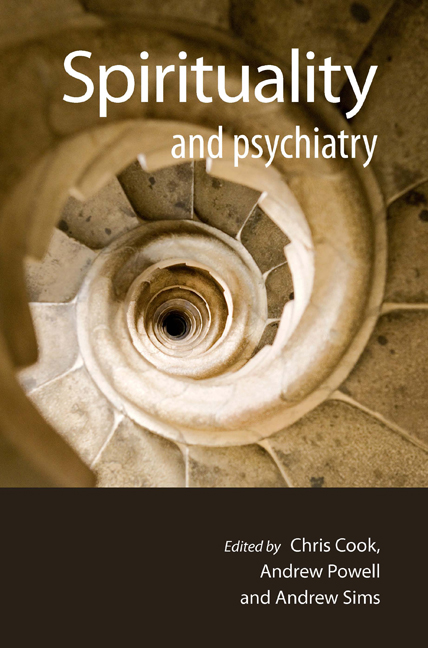Book contents
- Frontmatter
- Contents
- List of contributors
- List of tables, boxes and figures
- Foreword
- Preface
- The Spirituality and Psychiatry Special Interest Group of the Royal College of Psychiatrists
- 1 Spirituality in psychiatry
- 2 Assessing spiritual needs
- 3 Psychosis
- 4 Suicide
- 5 Child and adolescent psychiatry
- 6 Psychotherapy
- 7 Intellectual disability
- 8 Substance misuse
- 9 Neuroscience of the spirit
- 10 Spiritual care in the NHS
- 11 The transpersonal perspective
- 12 Religion and religious experiences
- 13 Pathological spirituality
- 14 Ageing
- Index
13 - Pathological spirituality
- Frontmatter
- Contents
- List of contributors
- List of tables, boxes and figures
- Foreword
- Preface
- The Spirituality and Psychiatry Special Interest Group of the Royal College of Psychiatrists
- 1 Spirituality in psychiatry
- 2 Assessing spiritual needs
- 3 Psychosis
- 4 Suicide
- 5 Child and adolescent psychiatry
- 6 Psychotherapy
- 7 Intellectual disability
- 8 Substance misuse
- 9 Neuroscience of the spirit
- 10 Spiritual care in the NHS
- 11 The transpersonal perspective
- 12 Religion and religious experiences
- 13 Pathological spirituality
- 14 Ageing
- Index
Summary
It is possible to fall into the heights, as well as the depths.
Holderlein, in Lind (2000)‘Pathological spirituality’ is, on one level, a misnomer and a contradiction in terms. The quality of spirituality, for the purposes of this book (see p. 4), is by definition the opposite of pathological dysfunction and disease, though it does embrace an approach to suffering.
The Jonestown massacre in the jungle of Guyana in 1978, the deadly Sarin nerve gas attacks in the Tokyo underground by Aum Shinrikyo in 1995, the suicide bombers of 9/11 in the USA in 2001 and the 7 July bombings in the UK in 2005 all illustrate how pathological and harmful spiritual values can be when doctrines take precedence over human health and well-being.
Two questions can be asked about the concept of pathological spirituality:
When do spiritual beliefs, practices and experiences become pathological?
Can apparently psychopathological mental states ever be understood as spiritual?
The second question has been explored in the context of a transpersonal understanding of the psyche in chapter 11, see ‘spiritual emergency’ (pp. 227–230).
Path or pathology?
The past hundred years has witnessed immensely destabilising changes within our society. Traditionally cohesive social structures, such as the church and the family unit, are losing their status (Murray, 2004). Different influences are exerting their effects far more powerfully than before via the media and the internet. We use, and are influenced by, technology beyond our understanding and are bombarded by information beyond our absorptive capacity. ‘Information disease’ (Conway & Siegelman, 2005) is a new category of disorders describing the lasting changes of mind and personality that may be brought on by, among other things, reckless or excessive use of popular spiritual and personal growth practices. Our cultural background and education has often not prepared us to navigate safely this new territory.
- Type
- Chapter
- Information
- Spirituality and Psychiatry , pp. 254 - 272Publisher: Royal College of PsychiatristsPrint publication year: 2009



